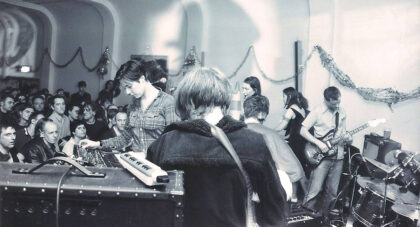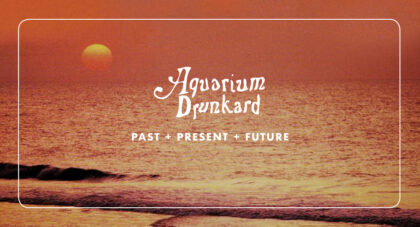A funny thing happens toward the end of “Cowards Starve,” the second song on Detroit post-punk quartet Protomartyr’s third album, The Agent Intellect. Singer Joe Casey delivers a weird, cutting line, as a synth buzzes in the distance: “I’m gonna tear that mountain down/I’m gonna turn it out/and go out in style.” And then guitarist Greg Ahee, drummer Alex Leonard, and bassist Scott Davidson lock into a tight, surging break, not unlike the silvery sound of early U2 or New Order, and the song shifts from a bleak rumination on “a weed-sick man in the throes of a bummer” to something cresting and furiously righteous. “I’m going out in style,” Casey repeats, deadpan. “I’m going out in style.”
The gnarled rock of The Agent Intellect covers a lot of ground. The Pope shows up, visiting the Silverdome in 1987. The devil’s there too, along with digital demons, racist gangs, and kings (of France and of pizza). Casey writes scenes filled with Detroit specifics – the eyes of “the queen of legal ads” Joumana Kayrouz, nights at his go-to bar Jumbo’s, Outer Dr. and 6 – but he also writes about universal themes. In these tightly coiled songs, the internet makes things weird, old bodies deteriorate, and salvation eludes desperate seekers. But it’s not all bleak. Love lives on even after lovers die. Scales fall from eyes. With his bandmates churning elegiac riffs behind him, Casey sings/speaks/shouts dour lines like “There’s no use being sad about it,” until he twists them into resonate and cautiously hopeful sentiments.
In advance of the album’s release Friday, October 9th, we phoned Casey to discuss Tinder, white privilege, religion, and emoting “a little bit.”
Aquarium Drunkard: I want to ask you about “Boyce or Boice.” In light of recent internet news, I couldn’t read the lyrics “your secret lovers/exist as numbers” without thinking of the Ashley Madison hack.
Joe Casey: I like to say that I predicted that through song. I saw an episode of 20/20 or something about a catfish that ended with murder. You just kind of realize that the internet is this big, vast thing, and everybody’s on it, just nerds talking about music or lonely people looking for love. I had some friends getting into Tinder, and it was weird seeing potentially life changing events reduced down to swiping left or right, reduced down to ones and zeroes.
AD: I don’t want to get completely hung up on the Ashley Madison thing –
JC: You got caught, right? Is that what you’re trying to say? [laughs]
AD: Yeah, it’s really ruined my life. [Laughs] As more information about that hack has come out, it’s become clear most people trying to cheat on their partners weren’t interacting with other people. It was already shitty, sad, and pathetic, and it just got more so. It points to the root loneliness at the root of everything, which is illuminated and made clearer by the internet.
JC: It reminds me of almost a science fiction notion. Like Minority Report, where you’re guilty of this crime before you’ve done it. Like this is a honeypot that was designed and you fell in it. Your basest desires have been revealed to be a sham.
If you search for “Boyce or Boice,” there’s a website about how to get demons out of your computer. It’s a cheesy, early ‘90s kind of website…it says something like, “The demons in your computer are called Boyce or Boice, and if your computer isn’t working or your printer isn’t working, just say ‘Get out Boice, get out of my computer.’”
I was like, holy shit, what is this? I don’t know how the fuck the internet works, and I think most people that use it don’t know how it works, so it becomes this mythical thing that’s taken over your life in a sense. It has this old-timey religious vibe to it.
Only the good shit. Aquarium Drunkard is powered by its patrons. Keep the servers humming and help us continue doing it by pledging your support.
To continue reading, become a member or log in.


